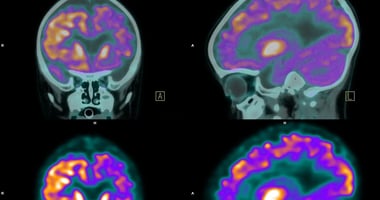Older individuals who are informed by health care professionals that they have elevated levels of...
Some Levels of Alzheimer’s Biomarkers May Differ Between African Americans, Whites
 |
“To our knowledge, our study is the first to examine racial differences in molecular biomarkers of AD in which the cohort contributed data for both amyloid concentrations as seen on PET scan and CSF [cerebrospinal fluid] concentrations of [amyloid and tau],” wrote lead author John C. Morris, M.D., of the Knight Alzheimer Disease Research Center at Washington University School of Medicine in St. Louis and colleagues. “Caution is needed in interpreting our results until they can be confirmed (or refuted) with subsequent analyses in larger cohorts to carefully explore the influences of socioeconomic status, comorbid diseases, and other factors that may contribute to racial differences.”
Morris and colleagues analyzed data from 1,255 adults who were participating in Alzheimer’s studies at the Knight Research Center; this sample included 173 African Americans. As part of these studies, the participants received brain scans and CSF samples were taken to assess for Alzheimer’s biomarkers. In both African-American and white participants, about two-thirds of individuals had normal cognition while the other one-third had Alzheimer’s or some other cognitive impairment.
The researchers found no racial differences in the average brain or CSF levels of amyloid beta among the participants. However, African-American participants had significantly lower CSF tau levels compared with white participants. Average CSF concentrations of tau were 293.65 pg/mL for African Americans and 443.28 pg/mL for whites. The discrepancy in tau levels between African Americans and whites was much larger among participants who had the ε4 allele of the APOE gene; APOEε4 is considered a genetic risk factor for Alzheimer’s.
“Given recent evidence that APOEε4 influences tau pathogenesis and tau-mediated neurodegeneration independent of [amyloid beta], … it is possible that the interactions of APOEε4 with tau in African-American individuals differs from its interactions with tau in white individuals,” Morris and colleagues wrote.
“Older African-American individuals, a population that is rapidly growing, are at greater risk of AD than are older white individuals, but are underrepresented in clinical research studies,” wrote Lisa Barnes, Ph.D., of Rush University Medical Center in an editorial accompanying the study. “[A]s the field moves toward a biological definition of AD, the underinclusion of minority populations in AD research will significantly hinder our progress as a field, and the race to end AD will not be shared with our most vulnerable, at-risk populations.”
For related information, see the Psychiatric News article “Are Amyloid and Tau Good Biomarkers For Alzheimer’s Disease?
(iStock/PeopleImages)






